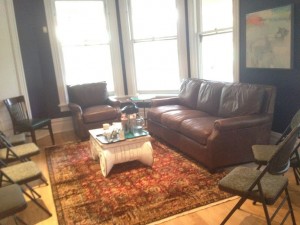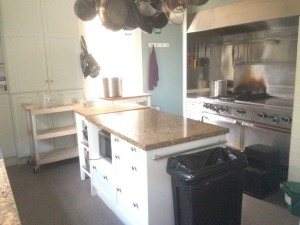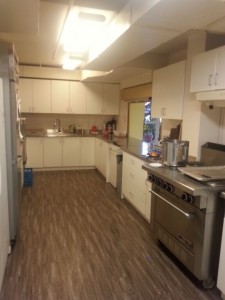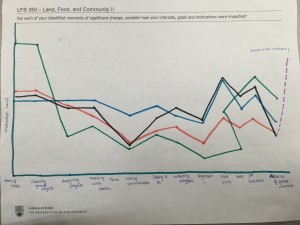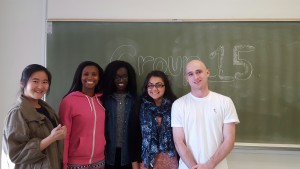I have always wondered what the real purpose of hosting a farewell party is. Most people I’ve asked believe that it’s for everyone to say their last goodbyes before the person leaves. Although that may technically be the case, I believe that be it for work, family or friends, farewell parties are a celebration of the person’s journey so far. It highlights all the relationships built, all the challenges faced, and all the lessons learnt by this individual in a particular setting. Rather than signifying the end of a journey it acknowledges his/her success and progress in this journey – a better job, a better home, the next stage in life. Similarly, this last blog is a highlight of our success, as a team and as individuals, on this project as well as an illustration of the knowledge we have gained that we will carry with us as we continue in our journeys.
Executive Summary
In collaboration with the Food Strategy Implementation Team at the City of Vancouver’s Social Policy department, us students from the University of British Columbia conducted field visits and interviews with supervisors of publicly accessible kitchens, in West End Vancouver. This neighbourhood comprises of Davie village, home to the city’s LGBT community, as well as Robson and Alberni streets that showcase high-end retail stores. However, the neighbourhood also has a higher percentage of population living below the poverty line, compared to the city, making them vulnerable to food insecurity. The objective of this study was to assess the type, use and condition of publicly accessible kitchens and, based on the findings, make appropriate recommendations to support kitchen programming that may be implemented as an approach to address food security issues in the community. In person interviews were conducted with kitchen supervisors, at four different facilities, using a survey including questions in regards to the use, management and equipment condition. Collected data was compiled using Microsoft Excel and analyzed using bar graphs. Analysis of the results showed that all the community kitchens surveyed offered different programs for the community. Three out of four kitchens allowed kitchen access only to designated volunteers and staff members. While only two out of the four kitchens were fully equipped to support programming in the community. This suggests that community kitchens closely monitor the changing needs of their neighbourhood in order to appropriately cater to its needs. Also, opening kitchen access to the public may encourage more community members to participate in kitchen programs. Lastly, funding may aid kitchens to expand their infrastructure and afford appropriate equipment for use in kitchen programs. Nevertheless, it must be considered whether community kitchens serve as long or short term solutions to food insecurity. Are there other aspects of the food system such as government policies or food production which may play a role in decreasing the prevalence of food insecurity?
What?
As our community kitchen project has come to an end, we have successfully collected the necessary data. We did, however, experience some challenges contacting facilities and arranging meetings. Consequently, we visited four kitchens instead of six (like we had originally planned).This being said, the four kitchens we did visit provided us with some valuable information. We obtained a wide range of responses which demonstrated the diverse needs of certain community kitchens. It is our hope that the results we obtained will be of use to our community partners.
So What?
Our findings are important because they provide an alternate lense to look through, helping us to understand the complexity of community kitchens. It is possible that through our data, we will contribute some knowledge and varying perspectives to the existing literature. Because our research is specific to the West End of Vancouver, it serves as a case study that may provide insight for those looking to gain more information on the issue.
Why else is this important? Why should people care?
Although we surveyed a small sample size which may not be representative of the entire Vancouver community, our research can be used to outline how some community kitchens are currently operated. Our analysis will give more information about the factors that are working for kitchens, others that are not and the reasons why. Our research and analysis will then direct the development of possible programming and help support kitchens in ways that are appropriate for meeting the needs of communities.
Now what?
Now, we need to analyze the data and produce a final report about our findings. This is the most challenging part of the whole process. It will require teamwork and cooperation from the entire group to complete this task. We will have to develop a report that correctly reflects our experience and clearly states the main findings. The report will be reviewed by our community partners, so it needs to be of good quality and appropriate. Ideally, everyone’s questions will be answered and the community partners will be able to use this information to further enhance their current knowledge about community kitchens. In the future, our findings may be used to implement more community programming in the West End. Hopefully, this project will have a positive impact and make a difference in the way food insecurity is handled in Vancouver.
The community kitchen project was a good experience and a good example of collective action. Students had the opportunity to collaborate with community stakeholders to tackle the issue of food insecurity in neighborhoods. This gave us a chance to develop many skills that will be useful in our future careers. Time management is an important skill that we learned throughout this journey. We also learned to persevere and work together as a group, regardless of the circumstance. We learned to identify the positives in both the high and low moments. One of the most important skills is to be able to reach the expectations and be accountable.
Farewell
We hope you have enjoyed reading all our blogs and until we cross paths again – “So long, farewell, auf Wiedersehen, goodbye” (The Sound of Music, 1965).
